- Home
- Chuck Wendig
The Hunt Page 4
The Hunt Read online
Page 4
She’d started taking the Adderall because it helped keep her awake—because sleep meant nightmares. Nightmares that stayed with her all day, like cigarette smoke in your hair and your clothes. “I got the opposite problem now. I don’t sleep.” Instead, she thinks, I just lie there, shaking like a leaf and sweating like a pig looking at the butcher sharpening his cleavers. I hear things in the house. I see shadows standing at the door—shadows of men, evil men, coming to kill me. She doesn’t say any of that, though. All she says is, “I need something to knock me out.”
“You still got the Ambien I gave you?”
She scrunches her nose. “Dang, I forgot about those. Yeah, maybe. I’ll probably need some more, just in case I can’t find ’em. They safe enough?”
“They’re pills. Pills are never safe.”
“I guess screw safe, yeah?”
He offers his bottle. She tinks hers against his, neck to neck. “Amen.”
CHAPTER FOUR
Atlanta’s back home, a new pill bottle rattling in her pocket like dice. Whitey’s outside when she gets there, and he comes bounding up the gravel driveway to meet her—it’s like this every day when she gets home. He runs, fast enough that she always thinks, He’s gonna slam into me like a runaway dump truck. But then he circles behind her and comes up alongside of her. He trots with her the rest of the way, matching her pace, never getting too close—but never drifting too far.
He respects her personal space. Some jerks could learn a thing or two from him.
(Whitey, she figures, is better people than most people.)
It’s about seven p.m. when she gets there. Mama’s car is in the driveway. So is a pickup truck, a Chevy Silverado that’s clean but has some miles on it. Next to that, a third car: an orange hatchback. Looks pretty new. Atlanta gives it a long look, sees a little stuffed panda bear dangling from the rearview. A girl’s car, if she had to guess. Huh. A new client, she thinks. And then she gets to wondering when she started calling them “clients.”
She heads inside, trying to guess what the hell is going on, but it doesn’t take long to figure it out—because as she pitches her backpack on the nook table in the kitchen, she sees into the dining room at the same time the smell of dinner hits her.
Table’s covered in a finished dinner: plates of mostly eaten food, a bowl of mashed potatoes, another of green beans, a long serving tray of pulled chicken. (It smells good, so she dang sure knows Mama didn’t make it.)
Sitting there is Arlene. Next to her is the new beau, Paul.
Atlanta steps into the dining room, and then she sees the third person. The driver, she guesses, of that girly car out front.
It’s Bee.
Becky Bartosiewicz. Her best friend. Once upon a time.
She’s sitting there, a plate in front of her, food picked at a little. A glass of Mama’s sweet tea—so sweet just a half glass will give you diabetes—sits in front of her, sweating like a perp. Long, straight hair framing her face. That innocent look she wears so well.
“What is this?” Atlanta asks, venom in her voice. “Some kinda intervention?”
“Hey, Atlanta,” Bee says.
“You’re late, missy,” Mama says.
Atlanta says, “Don’t play parent with me. Ten times out of ten you don’t care where I am or when I come home.” She thinks but doesn’t say: Just putting on a show for our guests, huh?
Arlene frowns and is about to say something, but Paul speaks up. “Atlanta, you shouldn’t speak to your mom like that—”
“Just because you’re sticking it in my mother doesn’t mean you get to be my daddy,” she seethes. “Word of advice, Paul: shut up.”
“You’re grounded,” Mama says.
“I’d like to see you enforce that.”
Mama stays silent, sitting there quivering like a plate of Jell-O on a wobbly table.
Bee says, “It’s okay. Atlanta, maybe we can go somewhere to talk.”
“You can talk to my ass,” Atlanta says, and she’s not even sure what that means, really—but it’s out there now, and the best thing she can do is drop the metaphorical mic and walk out of the room. So she does—she turns tail and heads for the steps, Whitey trotting along behind.
She sits and stews in her room for a while. Puts on the fan in the corner—it whirs and clicks as it turns. Whitey pants loud—hah, hah, hah, hah, hah.
From her pocket, she fetches her pills. Rolls the bottle around in her palm. Thinks, Maybe I take one now, maybe I just pass out. Heck, she is tired. Exhausted. It’s like she’s got concrete in her blood and mud in her shoes. And yet, her heart is beating a tom-tom in her chest, a timpani roll.
Soon, footsteps outside the door.
The pills go back in her pocket as someone knocks.
From outside, Bee says, “Can I come in?”
“No.”
“Please?”
“What’s the password?”
Without a beat, “Pistachio.”
And that is, indeed, the password. The two of them used to get high and eat pistachios—whenever Bee smoked weed, that’s what she craved. (Sometimes the joke became crasser: “You like salty nuts,” Atlanta would say. Bee’d ramp it up, licking the pistachio shells and her fingers: “I love salty nuts, mm-mmm. I’m going to pop these nuts in my mouth.” Then they’d laugh so hard they coughed and cough so hard they saw stars. Bee said that was good, because coughing made the high better.)
With the password spoken, Atlanta gets up, opens the door.
“’Sup, A?” Bee says, and hovers there.
“’Sup, Bee.”
Then, a big empty canyon of silence separates them. A silence so epic, it’s almost loud—like it generates its own kind of noise, a white noise that fills the ears, a blood noise. Atlanta’s about to say something—something dumb like, Hey so what’s going on or Boy, school is stupid or maybe something serious like, Oh hey, thanks for abandoning me and leaving me feeling all alone in a great big abyss, that was real awesome of you.
But Bee speaks first. “I’m pregnant,” she says.
Atlanta feels like she just got slugged. “Whoa.”
“Twelve weeks,” she says, and those two words have a tremble to them, a vibration like a teacup in a palsied hand. Bee’s eyes suddenly go shiny, and Atlanta thinks, She’s about to cry, isn’t she, but she doesn’t have to wait long to find out. It’s like an earthquake breaking a dam: the ground booming, the river roaring, because suddenly Bee is sobbing as if her whole extended family just got killed and eaten by wolves on live television—her body shakes, her shoulders tighten in so far she might fold up into a wad. The grief rolls through her.
Atlanta wants to get up, hug her. But something keeps her rooted to the bed. Anger, still. Resentment. Some little part of her that says, You deserved this.
All she can do, then, is wait it out. Bee stands there, alone, sobbing in a way that is emotional, physical, and maybe even spiritual all at the same time. Whitey stares as if to say, I don’t understand what this human is doing. Eventually, though, he’s the one who plods over and sits right next to her, his one good eye looking up at Bee, his nose nuzzling her hand.
Maybe that’s what helps to end it.
Like with all storms, this one drifts back out to sea, and soon Bee is left standing there, puffy-cheeked and pink-eyed, her face wet, her nose plugged. She sniffs and Atlanta tosses her a tissue box from her bedside.
Blow, honk, sputter. Two tissues, then three, then a fourth before all the demons are exorcised from her grief-struck sinuses.
Bee sits, staring off. Atlanta wonders if this is why the popular crowd ditched her. Pregnancy isn’t sexy. Nothing popular about being preggo. Still—she’s not showing yet, by the looks of it. Still a thin slip of a girl.
“So, ahh—” Atlanta starts to say.
“I want to hire you.”
“Pardon?”
“I want your help. And I don’t ask as a friend because I know that . . . that ship has probably sailed so fa
r it’s in Bora Bora by now. I can pay.”
“I don’t really get it,” Atlanta says, but then all the sudden she does get it. She heard stories when she came back from Emerald Lakes. Bee was with the popular crowd by then, and the popular crowd sleeps around. She went through a handful of boyfriends and she probably wasn’t chaste with them. “You don’t know who the father is, do you?”
A slight, small shake of the head.
“And you want me to find the father?”
A small nod.
“No” is Atlanta’s answer.
“What? Why . . . why not? I need your help.”
Tiger won’t stay caged for long, and here it comes, jumping through the grass. “Right now, you need me because you think I can do something for you.” She hears the volume of her voice going up, up, up. “Let’s say those words again: you need me. But when I needed you—where were you, huh? When my mama’s last boyfriend . . .” Her jaw clenches. It hurts to say it, so she doesn’t. “When I got sent away for months on end to some cuckoo cracker factory, and I had to sit there day in and day out in group, and take meds, and watch girls go deeper into crazytown, where were you? Did you come and visit? Or was I just too bombed out of my gourd, too much of a space-case, to remember?”
Bee stares down at her lap. “I didn’t.”
“No, I didn’t think so. What were you doing while I was gone, hmm? You and Petra and Susie. Huh, Becky, what were you doing?”
“Nothing, I—”
“Oh, you were doing something. You weren’t just sitting on your hands. You weren’t stitching me a sampler that said Welcome home, bitch. You were off making new friends. Shiny, popular friends. You care to sorta . . . pick that apart for me? How’d that happen, huh?”
“They . . . they just . . .” Her nostrils flare. She’s having trouble with this. Good, Atlanta thinks. This should be hard for you. Atlanta’s anger is like a nail sticking up through her shoe. She can’t shake it.
“They just what?”
“You were like a . . . celebrity. Like an, a . . . a what’s the word? An infamous one. And . . . I was here. You left me alone and—”
“I left you alone? Oh, girl, you did not just say that.”
“Wait! Wait, I don’t mean it like that. I mean it like—I was just here, and they wanted to know more because of, I dunno, morbid curiosity. And, like, they thought it was cool. That I was cool. For having known you.”
“They wanted to watch the car accident from behind a window. And you were supposed to be that window, right?”
Bee shrugs.
“Well, I’m glad I was able to be your stepladder. Even if that means I have to clean your boot print off my back.”
“I’m sorry. Okay? What do you want me to say?”
“Nothing. I don’t even want your apologies. I just want you to go.”
“I said I’ll pay.”
“And I said no. Now go. Your money’s no good here.” She gets up, holds the door open.
Whitey whines.
And Bee, blinking back tears, hurries out of the room.
Door: slam.
Outside. Nighttime. Whitey’s gotta go do his business—so he darts off, a white flash, looking for a place to deposit his leavings.
Atlanta stands out there for a while, thinking about when would be the right time to pop an Ambien, but then the breeze turns and a smell reaches her nose—a whiff of cigarette smoke. Every part of her tenses up as Paul comes walking up from the direction of their shed—a shed that looks half-collapsed like Whitey’s head. “Hey,” he says.
“Uh-huh” is all she says.
“You wanna talk about it?”
“Talk about what?”
“What happened at dinner. Or after. I heard some yelling.”
“Just a spirited game of Connect Four is all.”
He takes a few steps closer. He’s got a screwdriver in his hand. “She was crying when she left.”
“You know us womenfolk. Always on our periods, crying at every dish-soap commercial or country song.”
Paul drops the cigarette butt, puts a foot on it, and does the twist. “I think we’re maybe getting off on the wrong foot—”
“Throwing your cigarette butt on the ground like a careless shit won’t do you any favors. You think I want my dog eating that? That’s trash, and trash doesn’t belong on the damn ground.” Or with my mama.
A small, stiff smile, and he stoops over and fetches the butt before sliding it into his pocket. “You’re right. I’m sorry.”
“Whatcha need the screwdriver for?” She narrows her eyes.
“The door to your mother’s bedroom. Hinge is loose.”
“So, you’re gonna fix it.”
“That is the plan.”
“Just gonna swoop in and fix everything.”
“It’s just a door hinge, I promise.”
“Right. Sure.” Out in the dark, near the edge of the corn, another flash of white lightning as Whitey follows a scent. “Then it’ll be something else. The freezer in our cellar, maybe. Or the pipes in the bathroom that bang like a poltergeist when you turn on the shower. But I also know that eventually, that shit will turn around the other way. There’ll come a point where you’ll start messing things up instead of fixing them, because my mother? She has terrible taste in men. The last three men she dated, in order: One was a coke dealer in Virginia. The next was an alcoholic who was not a funny drunk but rather the kind who got angry, angry enough to punch a defenseless woman and knock out one of her teeth. The last of the lot was this smooth cut of rope who, as it turns out, had designs on the daughter instead of the mother. Turns out the daughter didn’t fancy him very much and he paid a very steep price for his mistake.”
Paul’s silent for a while. It means he knows. Not that it should surprise Atlanta, because it was in the news, and likely Mama said something anyway. But there he is, shifting nervously from foot to foot.
“I’m a good guy,” he says finally. “I’m a fireman.”
“That don’t make you a good guy. It just makes you a fireman. Something will come up and out, and when it does, I’ll be there to see it. And I’ll be there to deal with it and pick up the pieces of Arlene that you scattered all around.”
“It’s not like that. This will be different. How much you wanna bet?”
“It’s never different. And I don’t bet.” Whitey comes snuffling and snorfling back over. He lifts his head, suddenly, staring at Paul, and then to her, and then back to Paul, as if he’s not quite sure if he should be on alert or not. “Good night, Paul.”
Atlanta puts Whitey in the garage, then goes back inside. Soon as she’s in through her bedroom door, she dry-swallows an Ambien and waits for it to kick in. Eventually, it does. There on her bed, it’s like she sinks into it at the same time her head floats separate—like something is drawing her down to little pieces, as if she’s a soft dinner roll being pulled apart by probing hands. Part of her thinks to fight it. Panic arcs through her, quick as an electric current, but then she realizes: This is what is supposed to happen. For a moment, the room seems to be moving—furniture sliding around like it does on those cruise ship videos where the ship lists and tilts in a hard wave, and then she’s down, down, down, zoned out, gone off the deep end and—
CHAPTER FIVE
Waking up is clean. Like a toothpick poked into and pulled out of a batch of fresh-baked brownies: there’s nothing stuck there, no lingering feeling of oogyness, no baggage from sleep. The sleep itself felt . . . complete. Dreamless, dark, and deep.
It did the job. Whitey nuzzles her hand. Mama must’ve let him out of the garage early. He tends to whine and want out and Mama, she lets him.
It’s time to go to school.
The day goes all right. She’s not sleepy in class. Atlanta can actually sit there and pay attention. It doesn’t make any of it more interesting—good as Ambien is, it can’t make her care more about SOH-CAH-TOA or the Yorktown Campaign or Newton’s Laws. But at least she stays a
wake long enough to be bored. That’s something.
The one class she does like is English with Mrs. Strez. That surprises her. But it was something Mrs. Lewis said to her last year: Poems and stories have a way of helping us make sense of things. More and more, she’s finding that true. In the little notebook she keeps in the shoebox under her bed, she’s jotted down lines of poems she likes, or sentences from short stories they read in class. She’s not sure she has it right, what the authors really were laying down, but she’s also not sure it matters. Because once the writers are done with it, it’s not theirs anymore.
It’s hers.
(Plus, it doesn’t hurt that Strez isn’t docking her any points for failing to turn in her assignments. She’s supposed to do homework, isn’t she? Oops.)
In the computer lab, Shane and Kyle try to show her the stats on her YouTube video. Shane says, “Been a month since it posted, and now it has five thousand hits, and over a hundred comments.” Kyle adds: “A lot of them are pretty nasty.” Shane adds: “Never read the comments,” and Atlanta agrees. She tells them she doesn’t much care about any of this. The video’s the video, and it’s either gonna reach people who need it, or it won’t.
“I have no time for people who aren’t my people,” she says.
Later that afternoon, Atlanta sees Bee winding her way through the crowded hallway between periods. A thought hits Atlanta like a hammer to the head: It’s like watching myself from last year. The crowds part, almost imperceptibly, to let Bee pass. Nobody stares at her directly—no, that’d take too much moxie. That’d be too direct, too aggressive. But they shoot off a whole lotta side glances, heads turned one way, eyes looking back.
Which means they know she’s on the outs.
Do they know she’s pregnant?
Bee gets to her locker. Pops it open with a clang.
Something white pops out. She shrieks, steps back. Atlanta’s not far, only ten feet away, and the stink hits her—it’s shit. She smells bona fide feces. There, at Bee’s feet, is a wadded-up diaper. A bit of brown at the edges.

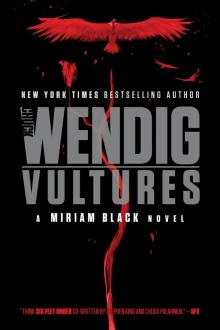 Vultures
Vultures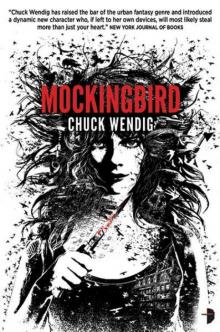 Mockingbird
Mockingbird Wanderers
Wanderers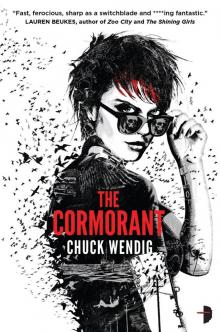 The Cormorant
The Cormorant Empire's End: Aftermath (Star Wars)
Empire's End: Aftermath (Star Wars)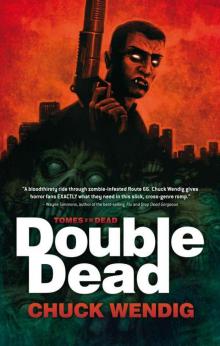 Double Dead
Double Dead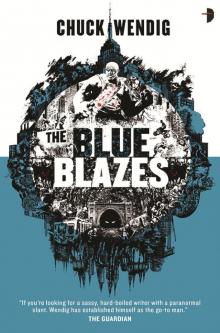 The Blue Blazes
The Blue Blazes 250 Things You Should Know About Writing
250 Things You Should Know About Writing Irregular Creatures
Irregular Creatures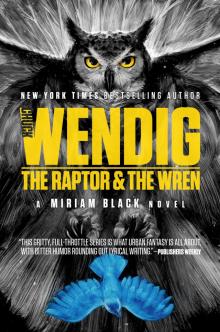 The Raptor & the Wren
The Raptor & the Wren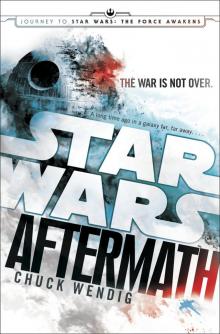 Aftermath: Star Wars
Aftermath: Star Wars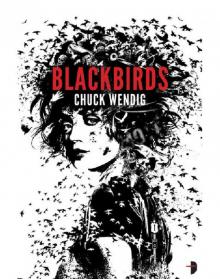 Blackbirds
Blackbirds The Hunt
The Hunt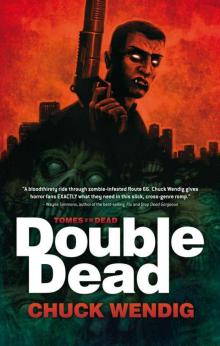 Tomes of the Dead (Book 1): Double Dead
Tomes of the Dead (Book 1): Double Dead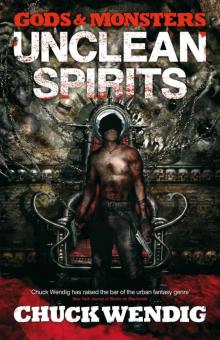 Gods and Monsters: Unclean Spirits
Gods and Monsters: Unclean Spirits The Harvest
The Harvest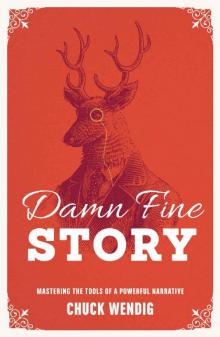 Damn Fine Story: Mastering the Tools of a Powerful Narrative
Damn Fine Story: Mastering the Tools of a Powerful Narrative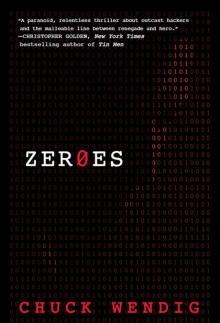 ZerOes
ZerOes Thunderbird
Thunderbird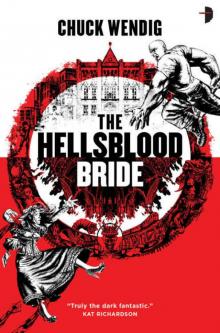 The Hellsblood Bride
The Hellsblood Bride Double Dead: Bad Blood
Double Dead: Bad Blood Life Debt
Life Debt